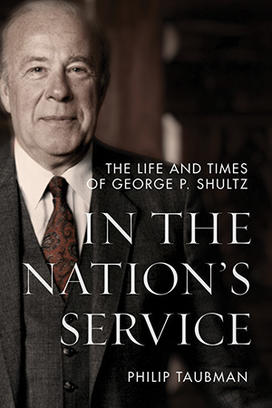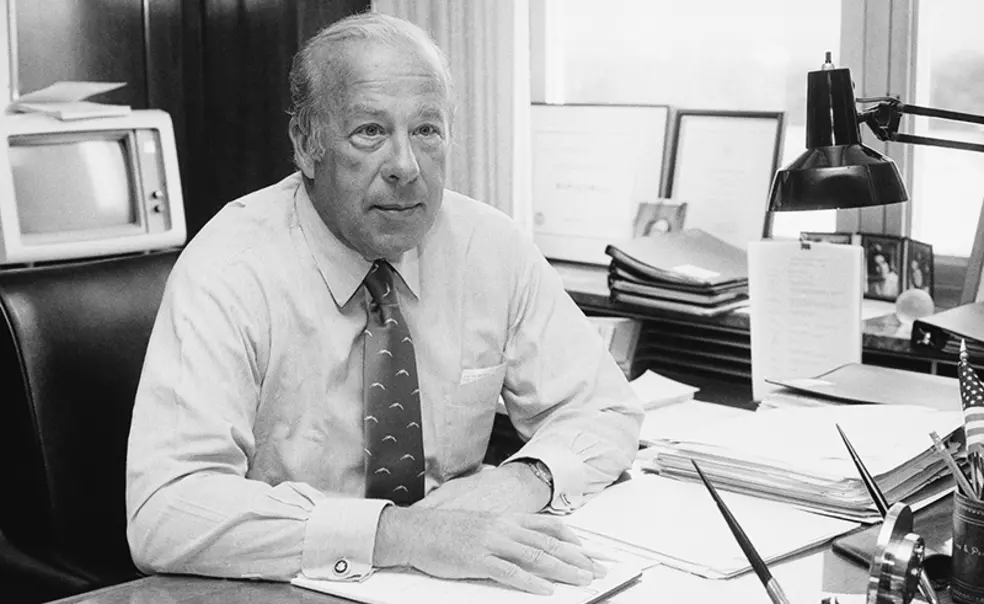New Biography Details Complex Career of Statesman George Shultz ’42
Shultz famously said: ‘Trust is the coin of the realm’
Only two people in U.S. history have held four Cabinet-level posts: Elliot Richardson and George Shultz ’42. During the Nixon administration, Shultz served as secretary of labor (1969-70), director of the Office of Management and Budget (1970-72), and treasury secretary (1972-74). He served as secretary of state (1982-89) during the Reagan administration.

Shultz, who died in 2021 at the age of 100, is the subject of a new biography, In the Nation’s Service: The Life and Times of George P. Shultz, by Philip Taubman, a former New York Times reporter and current lecturer at Stanford University’s Center for International Security and Cooperation. Taubman discussed Shultz’s legacy, especially in foreign policy.
Henry Kissinger once said, “If I could choose one American to whom I would entrust the nation’s fate in a crisis, it would be George Shultz.” What about Shultz made him say that?
Throughout his life, Shultz thought of himself as an academic, beginning of course at Princeton and then as a professor at MIT and the University of Chicago. The habits he learned were the hallmarks of his leadership in government posts. Perhaps chief among those was an absence of ideological fervor. Shultz believed in trying to make public policy in a bipartisan way. He eschewed histrionics, was a great listener, gave a lot of authority to subordinates, and was able to develop trust in people he worked with. What I think Kissinger was talking about was a sense of equilibrium, a steadiness, and an uncommon common sense in Shultz, who, of course, was also very smart to begin with.
Mikhail Gorbachev once said that without Reagan, the Cold War would not have ended, but without Shultz, Reagan would not have ended the Cold War. What did he mean?
Shultz was indispensable in ending the Cold War, and I think Gorbachev’s comment summarized it perfectly. When Shultz came into the Reagan administration in 1982, he found a group of aides around Reagan who did not agree with Shultz’s desire to ease East-West tensions. The Reagan rhetoric was also pretty hot: He had called the Soviet Union the Evil Empire, was investing billions building up American defense, and approved policies as president that went beyond containment to a policy of trying to roll back Soviet influence around the world.
Shultz’s first accomplishment, and it was the key to everything else that happened, was to build a relationship with Reagan. When he came in as secretary of state, Shultz didn’t know Reagan very well, and he ran into a buzzsaw of opposition among Reagan’s aides, so he spent the first couple of months flailing about. But he was very patient and persistent, and then he got a break. There was a blizzard in Washington in February of 1983. Suddenly, the Reagans couldn’t get up to Camp David for the weekend, so Nancy Reagan invited Shultz and his wife to the White House for a private dinner. And it was that night, in the family quarters of the White House, that Shultz really began to understand that Reagan also wanted to ease East-West tensions and wind down the Cold War.
Once Shultz had built a relationship with Reagan, they were ready to open a dialogue with the Kremlin, and their great good fortune, a kind of coincidence of history, was the elevation of Gorbachev to become Soviet leader in March 1985, and then his appointment of Eduard Shevardnadze as foreign minister. So, you had four men, none of whom was invested in the Cold War doctrines of their countries, who came into power and found that they had this improbable common agreement to wind down the Cold War.
During his years in Washington, Shultz worked alongside two other Princeton alums, James Baker ’52 and Donald Rumsfeld ’54, both of whom were known as very skilled bureaucratic infighters. How did Shultz’s style differ?
I don’t know if Baker and Rumsfeld developed those sharp elbows at Princeton, but I don’t think that Shultz did. It was something that handicapped him as secretary of state, because he encountered fierce opposition to what he was trying to do and couldn’t figure out how to out-maneuver his opponents. Having seen the dysfunction around Nixon, you would think Shultz would have known exactly what to do as secretary of state, facing this coterie of opponents, but he didn’t.
There was a phrase Shultz often invoked: “Trust is the coin of the realm.” But in order to build trust, you need to have access to the people you want to build trust with. He didn’t seem to have the bureaucratic canniness to figure out how to open the door to those one-on-one meetings with Reagan. Once he had it, he was able to build a productive relationship despite Reagan’s famous aloofness. So, in some ways, Shultz couldn’t have been more different from Baker and Rumsfeld.
What did Shultz think about the deterioration of U.S. relations with Russia under Vladimir Putin?
In talking to Shultz in the years before he died, I found him depressed and alarmed by a lot of developments. People ask me, what do you think Shultz would have done after the invasion of Ukraine were he secretary of state? I have no doubt he would have done almost exactly what Biden has done.
It was often rumored that Shultz had a tattoo of a tiger on his posterior. Can you confirm this rumor, once and for all?
I believe I can, unless one is required to have been an eyewitness to the tattoo, which I cannot claim to have been. A classmate of Shultz’s [Norman “Topper” Cook ’42] got a tattoo on his butt at the same time. He wrote a letter about it to his father, in which he says that they went up to New York after Pearl Harbor and tried to enlist in the Canadian Air Force. Shultz was turned down because of bad eyesight. So, what do two Princeton students do when their patriotic fever is blunted? They have a couple of drinks and then they go to a tattoo parlor and have tigers tattooed on their butts. I think that is definitive.
Interview conducted and condensed by M.F.B.
Read an excerpt from Taubman’s book on PAW’s website.












3 Responses
Arthur Puff
1 Year AgoA Man of Great Wisdom
My father fought in the Palau Islands in the 81st division alongside Mr. Shultz. I always wanted to approach Mr. Shultz, but I never got around to it before he passed. I also attended the University of Chicago so I felt twice connected to this great man. His wisdom is frequently missed.
Raymond (Beau) Carter ’65
2 Years AgoTiger Tattoo Plans
I loved the piece on George Shultz ’42 (Princetonians, July/August issue). I never doubted the tattoo story and always thought it was cool that he and wife Charlotte were charming San Francisco high society while he was walking around in a tux with a tiger on his butt. So I decided a few years ago that on my 80th birthday I would get a tiger tattoo as well, my first and only. That is a scanty four months away so I am busy asking younger men and women where they got their ink. Alas, my posterior at 79 has gone to jelly so I am getting the Princeton tiger icon tattooed on my upper left shoulder!
Norman Ravitch *62
2 Years AgoPrincetonian Influence
As passing worthies in government who are Princeton alumni are discussed, it might be prudent to remember that the influence of a Princeton education, much as we may like to praise that, has had very different results in some very different people, going back to the very beginning in the Age of Enlightenment.